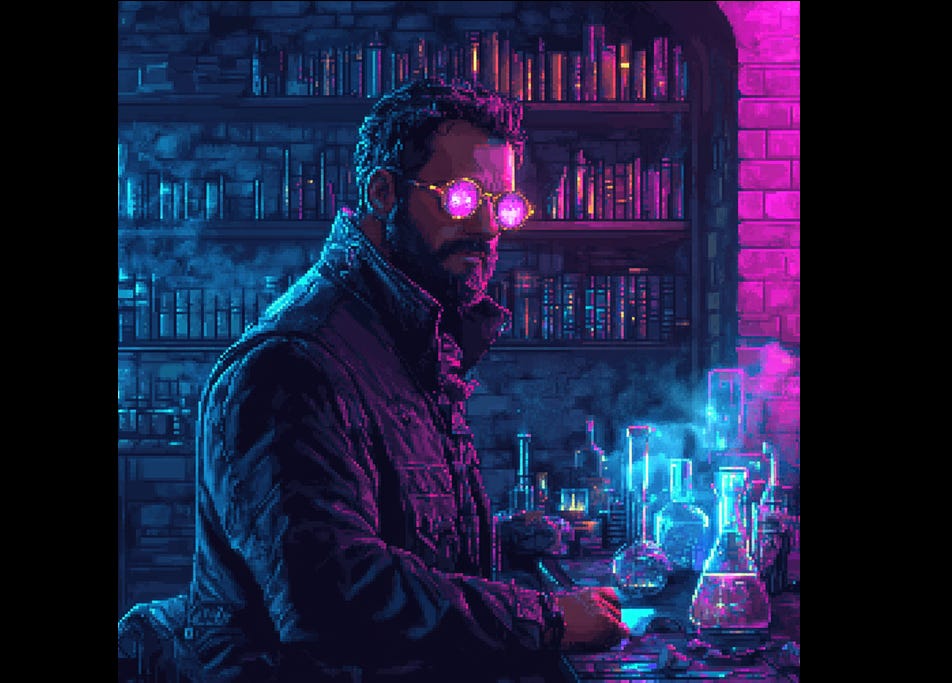A few years ago, I wrote about Michael Singer’s book The Surrender Experiment. I liked the book, but I didn’t “get it.” Singer was on a spiritual path, and at the time I had no experience with that. His approach to life was to “do the work as though it were given to you by the universe itself - because it was.”
That went right over my head. Instead, I latched on to the idea of flow, effortlessly participating in the “unfolding.” I missed the profound — and profoundly challenging — idea underneath. “Do whatever is put in front of you,” Singer wrote, “with all your heart and soul without regard for personal results.”
No judgment. No aiming for a particular outcome. No “like and dislike.” No you, really. When Singer got involved in a dotcom debacle I wondered if his “passive acceptance” had not landed him in misery. Well, yes, from a conventional point of view, losing a fortune and being under indictment is an undesirable outcome.
But Singer’s only goal was to “get rid of himself.” That perspective made “every situation a fruitful experience,” an opportunity to remain the observer of his inner voice, to be in a place of deep stillness, and to not return to identifying with his “Mickey Singer” personality. Business career finished? Great, time to write books and teach!
I am revisiting his work for two reasons. First, people keep bringing him up and I feel resistance and that’s a signal in itself. Second, I am kind of living the experience already. Reluctantly and without being all Zen about it.
The most obvious example is that I don’t know what will happen after my lease ends. There are thoughts and ideas, but no strong intuition, no pull, no signal. What if I let go of the tiller and… let things unfold? I experienced a similar back and forth in writing, at times embracing the weird before anxiously snapping back to the safe ground of the known.
How often can you say I don’t know when someone asks what you’re going to do next? After a while, you feel like an idiot (and like avoiding people). How come I don’t know, you wonder again and the inner dialogue spins up for another loop. Well, we’re still in the middle of the experiment of following flow and curiosity. What, the experiment of our life? Are you mad?
So, that’s the catch. Being of two minds rather than of no-mind as Singer was. He felt himself get “more peaceful inside” as he dealt with the “ever-increasing magnitude of challenges.” I still find myself waking up at 3 in the morning..
“Life was molding me each day to become who I needed to be in order to handle tomorrow’s tasks,” he wrote. “All I had to do was let go and not resist the process.” Something to aspire to.
But you don’t have to turn your whole life into an experiment. I highly recommend Anne-Laure Le Cunff’s four step framework for “a personal growth laboratory.” I recently saw her at an event for her new book Tiny Experiments and I’ve rarely seen an audience so amped up to go out and just try more stuff (I pre-ordered the book that night).
Four steps to be more curious in areas like work, creativity, relationships, health/sports, and learning/input/new experiences:
Observation: Assess the current situation
Hypothesis: Formulate a research question
Test your hypothesis — “one action repeated enough times to collect sufficient data.”
Analyze the results
Phrase the experiment like this: I will do [action] [_ number of times / for _ time period.]
Don’t judge the results until you’re finished.
For example, in January I noticed my instruments sitting at home. My experiment was to invite a dozen people that month to my place for one-on-one sound meditations. This led to many wonderful conversations with old and new friends — but only two sessions of sound meditation.
What to make of that? Could have been the winter weather or people just being too busy. Maybe the sample was too small, or I didn’t do a good job “pitching” the experience. But maybe “the situation unfolding in front of me” was asking for something else.
Last summer, I filled a notebook with Milch’s inner dialogues. Among many insights, it led me back to alternating between German and English in my writing. Then I committed to 28 days of writing to unlock emotions. It’s a profound experience, one I revisit regularly when I notice that I am “swallowing” emotions.
After immersing myself in these methods, I keep having deep conversations about writing, journaling, creativity, healing, and personal transformation (I am collecting notes on this page). I even started coaching people with bespoke journaling prompts. Sound meditation is not that interesting right now? Let’s work on experiments to help people re-write their stories.
That’s why I like short experiments: after committing to a sprint, I get to try something new. It’s a way to be both disciplined and flexible, to move with life’s rhythms and follow the resonance.
The experiment I would recommend is — drum roll — to try a radical journaling practice. What if you committed to five sessions, twenty minutes each… I’m thinking of finally doing that monthly Zoom hangout to discuss writing/journaling prompts and whatever comes up during the solo sessions. Stay tuned for that.
I am also talking to the Substack support team about lowering the price of the subscription for new and existing subscribers (something I can’t adjust by myself). Clearly, this is no longer a finance publication but just me wrestling with everything I find fascinating and difficult — money, life, spirituality, love, books, writing, etc. I think it makes sense for the price to reflect that “personal interest” territory.
It’s time to (re-)commit to the path. What if I don’t make plans but remain open to what arises? What if I just keep meeting the moment with presence and curiosity? Will something come up or will the boat crash? I have no idea!
Will I live in a van down by the river? I hope not.. but see, that’s what makes it so tricky. Already back to like and dislike.
Well, there’s only one way to find out. At least it will be a proper experiment.
Try new things like your life depends on it. Maybe it does.
— Frederik






Terrific, as always Frederik. Your words remind me of one of my favorite quotes from Joseph Tussman: “What the pupil must learn, if he learns anything at all, is that the world will do most of the work for you, provided you cooperate with it by identifying how it really works and aligning with those realities. If we do not let the world teach us, it teaches us a lesson.”
I absolutely loved reading this piece and the connections you made across various forms of experimentation. I'm one of the people who wanted to join a sound healing session and couldn't make it - definitely busyness and winter tiredness in my case, which ironically would have made this little break all the more helpful :)